The Suffolk manor house where 60 people live together
- Published
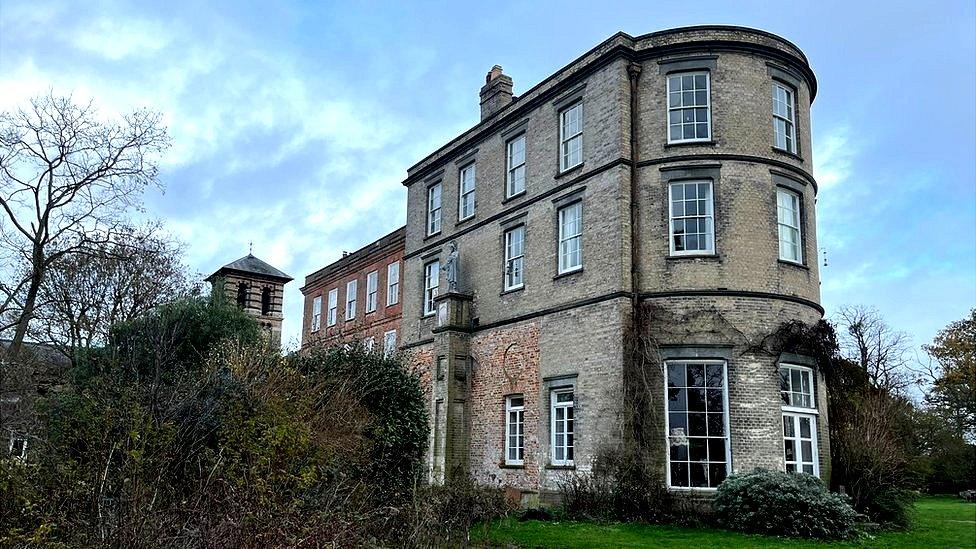
Members of the Old Hall community, which dates back to 1974, are aged from one to 95
A group of 60 people who live together in a large house say they are thriving during the cost-of-living crisis.
The Old Hall community share a former friary in East Bergholt, Suffolk, where they live off 65 acres (26 hectares) of land.
They are working towards self-sufficiency in energy and food, with group meals prepared on a rota system.
The manor house has 130 rooms, shared between 44 adults and 15 children plus volunteers and guests.
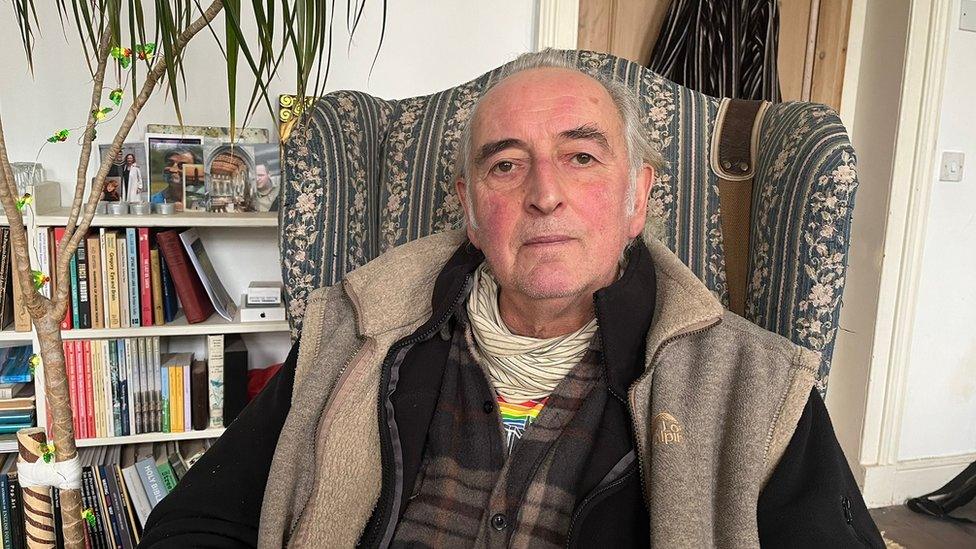
David Hodgson, 74, moved to the community in 1988 and has lived in a two room unit there ever since
David Hodgson has lived at Old Hall since 1988. He raised two children there and worked locally three days a week as a design lecturer, before retiring early to look after the orchards, where he is responsible for 75 apple trees and 30 plum and pear trees.
"Because we work collectively and we pool our resources together - we've got someone with lawyer skills, someone with architecture skills, people who can do thatching and lay hedges, builders and plumbers - it is more economically viable and it takes the stress away," he says from the armchair in his cosy unit.
David, who is 74, says he feels sorry for people his age living alone, who don't have a "fantastic social life" like him.
"They're very lonely and that is a terrible thing," he says.
"I've always got people to talk to, like interesting volunteers from places like France, Spain, Thailand, Japan and America."
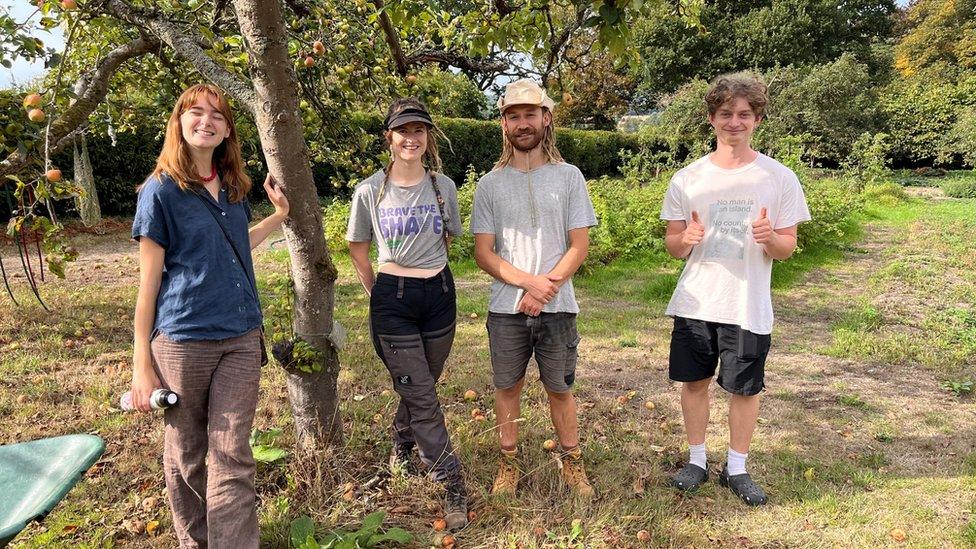
The group hosts volunteers, including this team of four who spent the summer working in the orchard
Old Hall, which dates back to the 16th Century, was a convent, an army barracks and a friary before it was bought in 1974 by 14 families who formed the community. Some of the original members still live there, including the current eldest resident, who is 95.
During Covid, they closed their doors and imposed their own lockdown earlier than the government, meaning they kept all of their elderly members safe.
Every resident does around 15 hours of work a week in the house or gardens, from cleaning and gardening to milking the cows and looking after the sheep, pigs, chickens and bees. They make their own butter, cheese and yoghurt and grow their own wheat for bread.
Many of the members also have part-time paid employment outside the community.
"Most people find they only need to work a few days a week to pay their bills because they are so much lower. There is never a shortage of people to look after the children when they go out to work," David says.
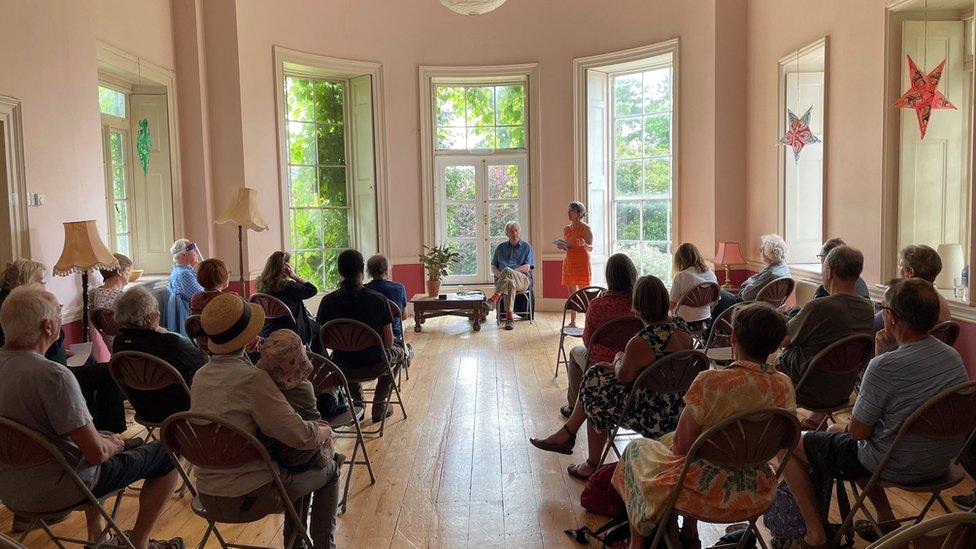
Social historian Ken Worpole gave a talk to the members in the Queen Anne room at Old Hall
A large kitchen and dining room, sewing room, ballroom, library, workshops and a chapel are all shared. Members have their own private rooms, with a family likely to have several rooms, but all bathrooms are communal, David explains.
If a member wants to leave, the community has to find someone to replace them. New members must buy a share in cash which goes straight to the person leaving. In return, they get a loan stock certificate which buys into a housing association.
David bought a two room unit for £19,400 in 1988, which is now worth £125,000, because Old Hall keeps in line with the house price index. He pays a monthly maintenance charge of £240 which covers gas, electricity and insurance and £80 a month for food, with no other outgoings.
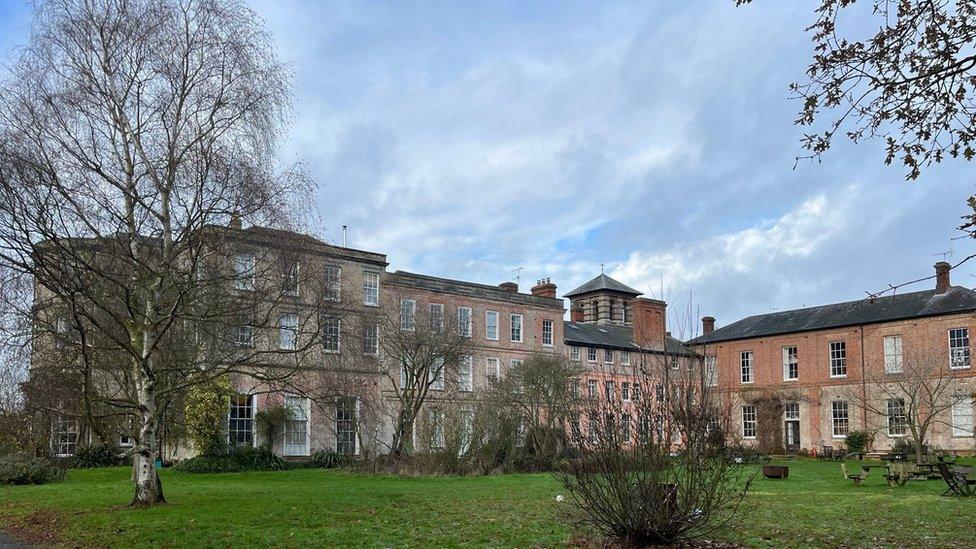
Old Hall is in the middle of the village of East Bergholt in Suffolk, which has several shops and pubs
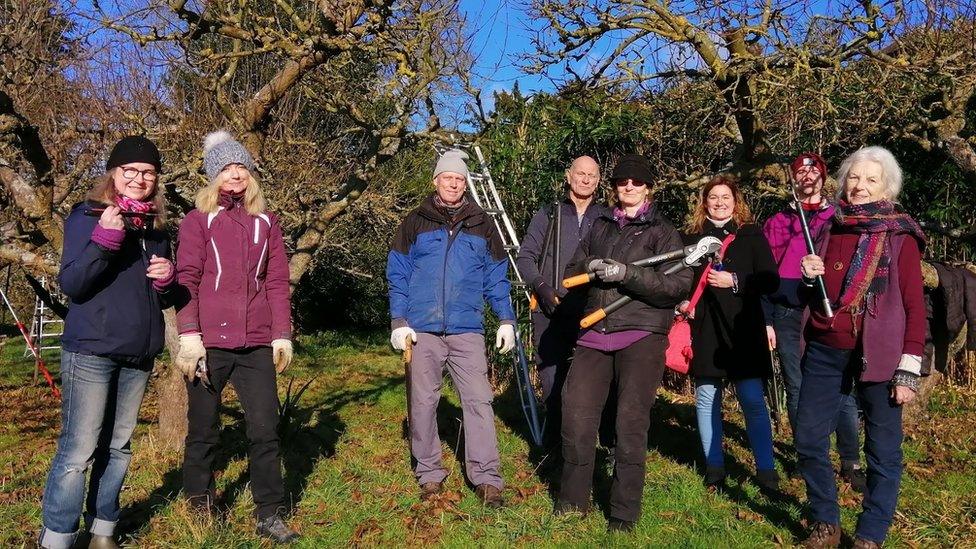
The members took part in an apple pruning workshop last year
Each year they elect a committee, with decisions made by the whole group during weekly Friday meetings.
"We don't have a religious base - we describe ourselves as a farming, family-based community," David says.
"We have to vet our members very carefully because we need people who are going to give and take and we need them to have certain skills.
"Of course we do have conflicts but we work through them. We talk through issues until we reach a consensus."
Helen Jolly, 46, who works part-time as a doctor at a local hospice, moved to Old Hall with her six-year-old son Robin nearly five years ago, having previously visited as a volunteer.
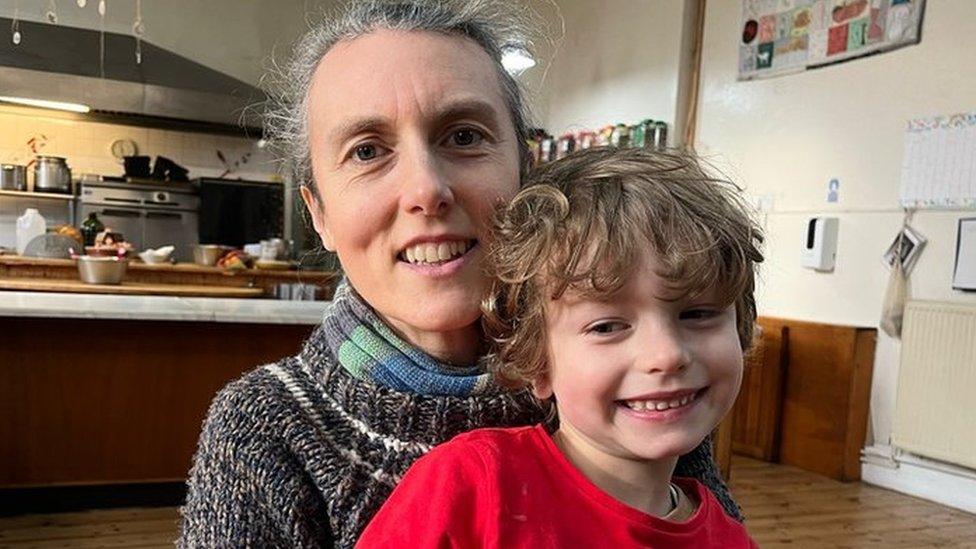
Helen and her son Robin moved to Old Hall nearly five years ago
"It is wonderful for Robin having access to the farm, the fresh food, all the space and always having friends to play with. The friendships do become intense at times, like with siblings, and there are tensions to work through but it's a lovely way to live. Compared to mainstream life it just has so many advantages," she says.
Helen, who is busy preparing lunch for the members, explains they buy any food they're not able to produce in bulk to keep costs down, and growing beans is her responsibility.
"We are shielded from the cost of living crisis to a large extent because we share our resources," she says.
"I can't see myself return to mainstream living. I've always been someone who saw the downsides of that. This was really a natural progression for me."
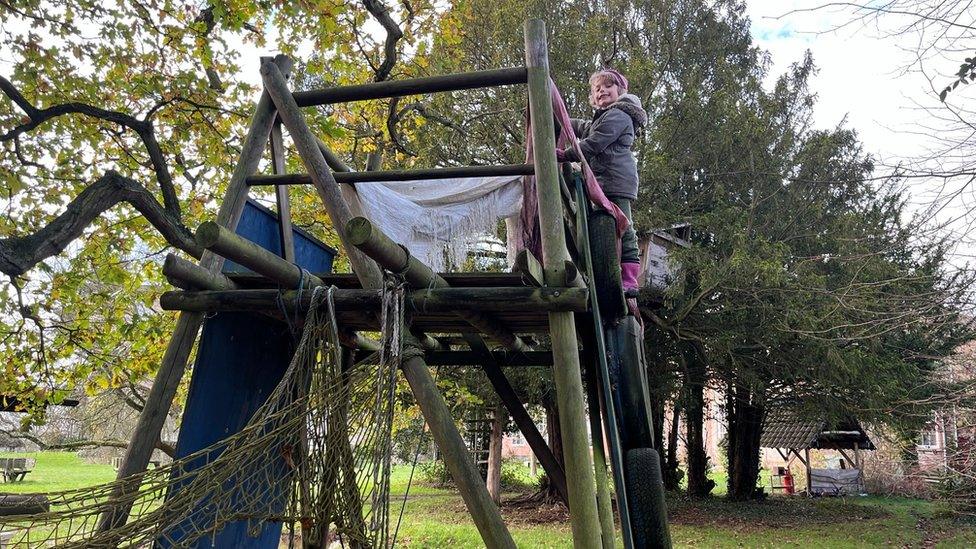
Robin enjoys playing in the garden at Old Hall, which features a climbing frame, swings, wooden boat, treehouse and a den
Solar panels supplement their electricity usage and their water - which comes from their own borehole - is heated by a large woodfired biomass boiler they call "The Dragon".
Volunteer Lara Lewington, 46, is "feeding The Dragon" with waste wood as she chats about her quest to try and make the house more energy-efficient during her six month stay.
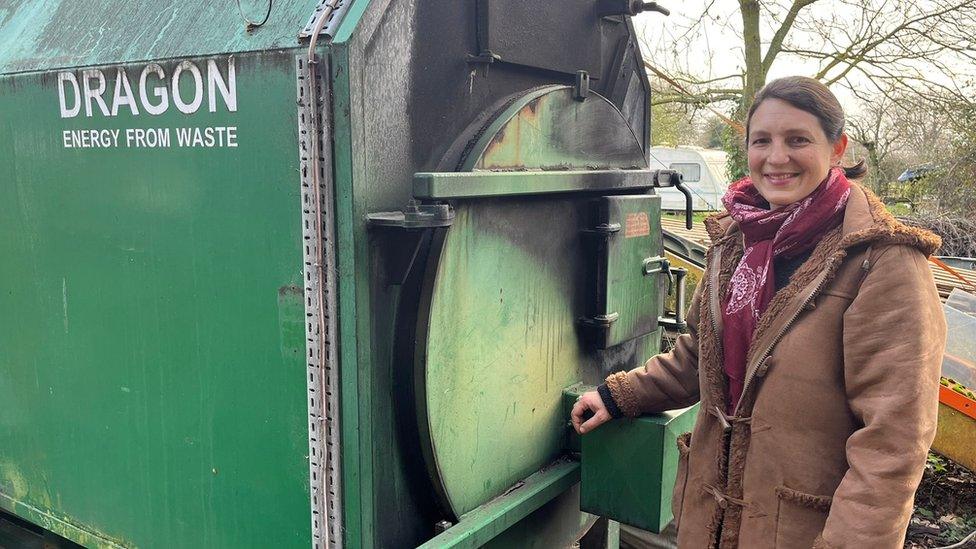
Lara is staying at the house for six months as a volunteer, working on energy efficiency
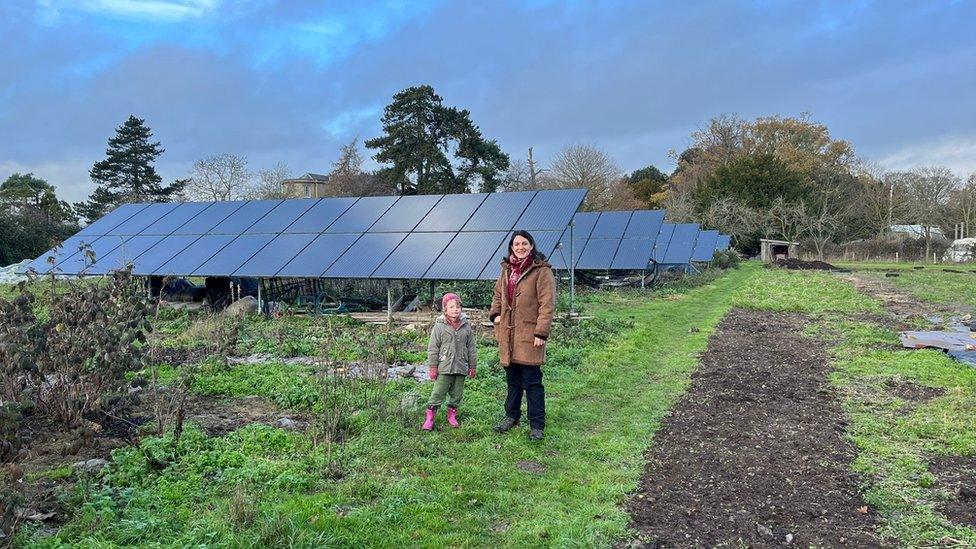
The house is partly powered by solar panels
"The Dragon has got a water jacket around the furnace area and the water is heated by the fire inside which is then pumped down a channel underground to the house to supply hot water and the central heating system," she explains.
A bell rings from the chapel meaning it's time for lunch, and the members head inside to enjoy a spread of pasta, soup and roasted vegetables.
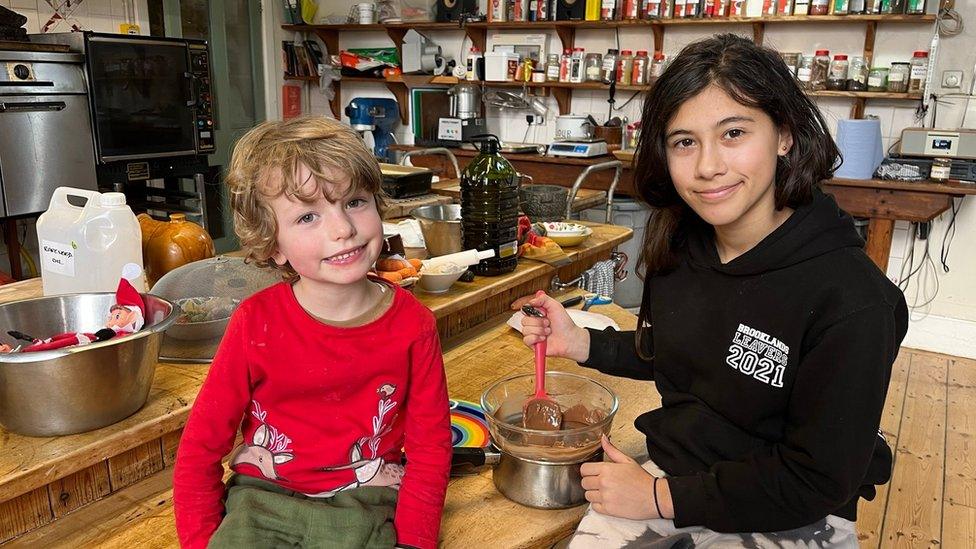
Lalima and Robin love living with a large group of people
In the kitchen, 13-year-old Lalima Watling is dipping raspberries grown by her family in chocolate. She moved to Old Hall four years ago from a small house nearby and goes to the local high school.
"It would be very hard to go back to normal living after this because its so sociable and there's so much open space here," she says.
Lalima is hoping to be a graphic designer when she grows up, but she can't see herself living traditionally in the future.
"I don't think I will ever live any other way again. I really believe that communal living is how humans are supposed to live."

Find BBC News: East of England on Facebook, external, Instagram, external and Twitter, external. If you have a story suggestion email eastofenglandnews@bbc.co.uk, external